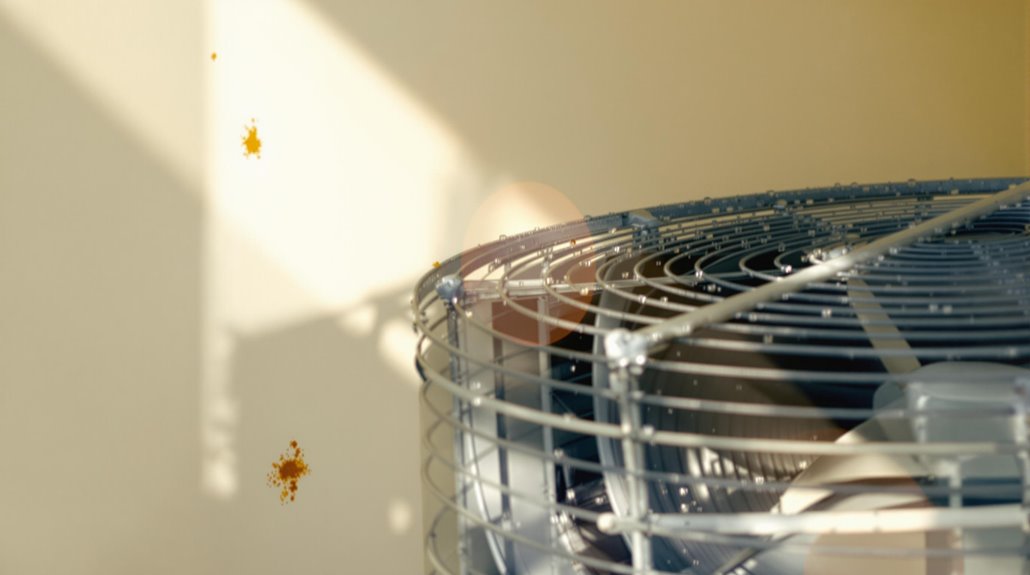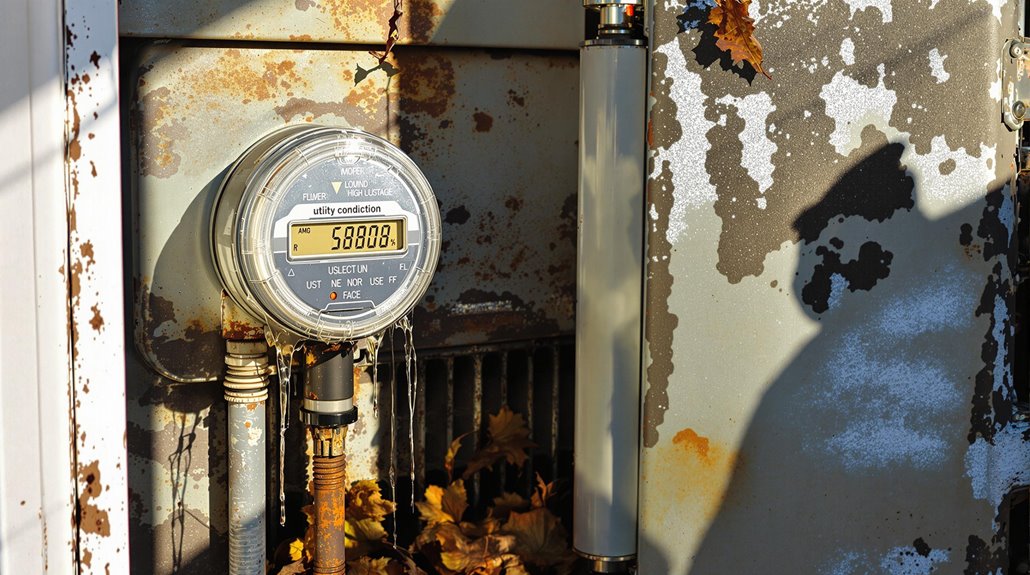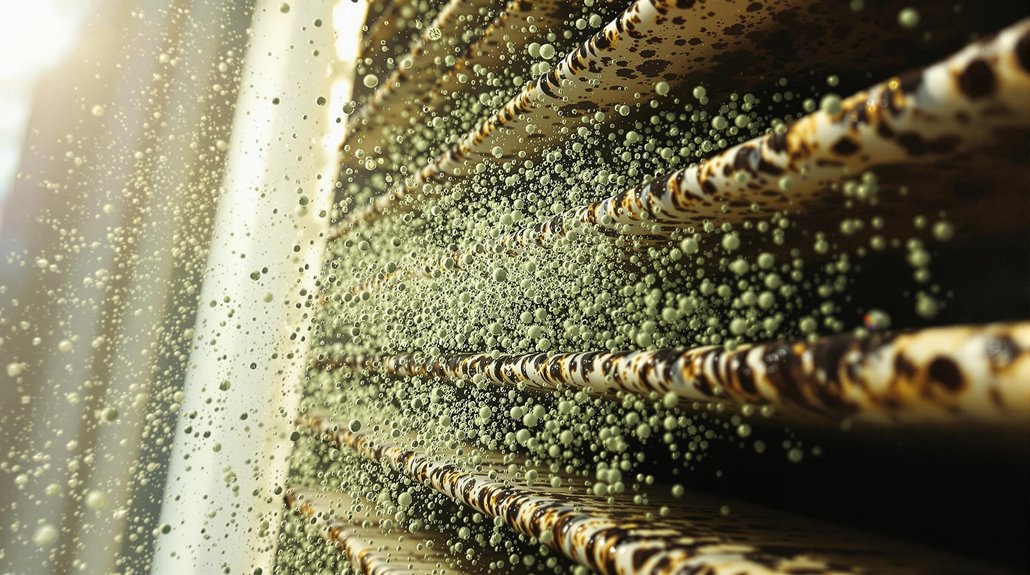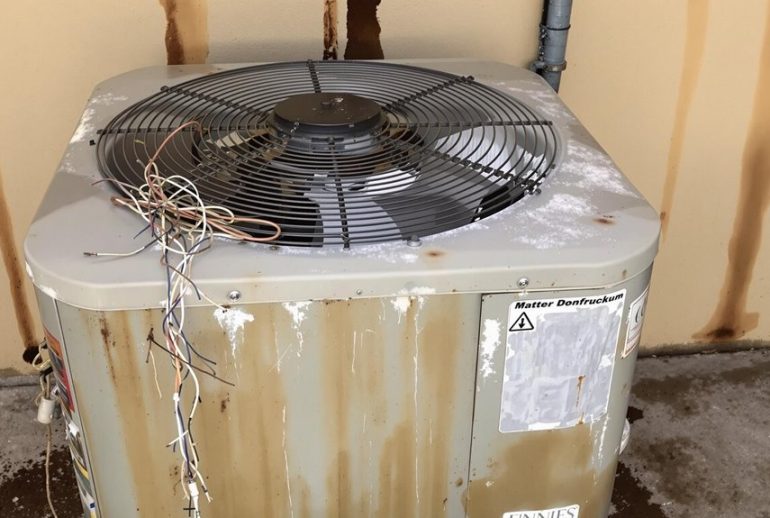Watch out for these critical AC warning signs that demand immediate attention: strange grinding or banging noises, weak airflow between rooms, unexplained spikes in energy bills, and persistent moisture issues. You’ll also want to address any unpleasant odors from vents, constant system running without cooling, or frequent on-off cycling. Understanding these red flags can help you prevent costly breakdowns and keep your home comfortable all summer long.
Strange Noises and Unusual Sounds From Your AC Unit

“When your air conditioner starts making unfamiliar sounds, it’s often one of the first signs that something isn’t working properly,” warns Bert Miskell, owner of BPM Heating & Cooling, which provides ac repair in Frederick, MD and beyond.
Listen for specific noises like grinding, which can indicate worn bearings or motor problems. Squealing or screeching might mean a damaged belt or compressor issues, while banging or clanking suggests loose components inside the unit.
You’ll want to pay attention to buzzing sounds, as they could point to electrical problems or loose parts. Clicking noises during startup and shutdown are normal, but constant clicking might signal a failing thermostat.
If you hear whistling or hissing, your AC might’ve a refrigerant leak or ductwork issues. Don’t ignore these warning sounds – they typically worsen over time and could lead to costly repairs if left unchecked.
Weak or Inconsistent Airflow Throughout Your Home
Have you noticed some rooms in your home feel warm while others stay perfectly cool? This inconsistent airflow is a clear warning sign that your AC system needs attention.
Several issues could be causing this problem, including blocked or leaking ductwork, a failing blower motor, or a clogged air filter.
Don’t ignore these airflow issues, as they’ll likely worsen over time and lead to higher energy bills.
When your AC struggles to distribute air evenly, it works harder to maintain desired temperatures, putting extra strain on the system. This added stress can shorten your unit’s lifespan and potentially cause more expensive repairs down the line.
If you’re experiencing weak or uneven cooling, it’s time to call a professional AC technician to diagnose and fix the underlying cause.
Unexplained Increases in Energy Bills

A sudden spike in your monthly energy bills often signals trouble with your AC system, especially if you haven’t changed your cooling habits.
When your air conditioner isn’t operating efficiently, it has to work harder and longer to maintain your desired temperature, consuming more electricity in the process.
Several issues can cause your AC to waste energy:
- A clogged or dirty air filter that restricts airflow and forces your system to run longer
- Refrigerant leaks that make your AC struggle to cool your home effectively
- Worn out or failing components that reduce the system’s overall performance
Don’t ignore these unexplained cost increases, as they’ll only get worse over time.
Contact an HVAC professional to inspect your system and identify the underlying cause of the energy waste.
Persistent Moisture and Humidity Issues
Your air conditioner should manage indoor humidity levels while cooling your home, keeping them between 30-50%. If you’re noticing excessive moisture, foggy windows, or a clammy feeling indoors, your AC system might be failing to dehumidify properly.
Watch for water stains on walls or ceilings, musty odors, and condensation on air vents – these are clear signs something’s wrong. High humidity doesn’t just make you uncomfortable; it can lead to mold growth, wood rot, and structural damage.
You might also spot water pooling around your indoor unit or notice your AC’s drain line isn’t flowing properly. Don’t wait to address these moisture issues. A malfunctioning AC could have a clogged condensate line, frozen evaporator coil, or incorrect unit size for your space.
Unpleasant Odors Coming From Air Vents

Strange smells wafting from your AC vents shouldn’t be ignored, as they often signal serious system problems. Different odors can indicate specific issues, from mold growth to electrical malfunctions. If you notice musty, burning, or rotten egg smells, it’s time to call a professional AC technician immediately.
Common AC odors and their causes include:
- Musty or moldy smells: Usually indicate moisture problems, mold growth in your ductwork, or a clogged condensate drain line
- Burning or electrical smells: Could signal overheating components, burnt-out motors, or frayed wiring that poses fire risks
- Rotten egg or sulfur odors: May indicate a gas leak, especially if you have a gas-powered furnace connected to your HVAC system
Don’t try to mask these smells with air fresheners – address the underlying problem promptly.
AC Unit Running Constantly Without Cooling
While unpleasant odors can alert you to AC problems, watching your system’s running patterns offers another key warning sign.
If your AC runs continuously but doesn’t cool your home effectively, you’re likely facing a serious issue. This problem often indicates a refrigerant leak, dirty coils, or a failing compressor.
You might notice your energy bills climbing while your home stays uncomfortably warm. Don’t ignore these symptoms, as they can lead to complete system failure and more expensive repairs.
A properly functioning AC should cycle on and off throughout the day, maintaining your desired temperature. If yours isn’t doing this, it’s time to call a professional technician who can diagnose and fix the underlying cause before your system sustains permanent damage.
Frequent System Cycling and Short Run Times
The opposite of constant running, frequent cycling – where an AC unit rapidly turns on and off – signals another concerning issue.
This behavior, known as short cycling, can greatly reduce your system’s efficiency and lifespan while driving up energy costs. When your AC turns on and off every few minutes instead of running complete cooling cycles, it’s time to investigate.
Common causes of short cycling include:
- An oversized AC unit that cools too quickly and can’t properly dehumidify your space
- A failing thermostat that’s sending incorrect signals to your system
- A frozen evaporator coil that triggers the system to shut down prematurely
If you notice your AC cycling more than 2-3 times per hour, contact a professional technician to diagnose and fix the underlying problem before it leads to system failure.
Conclusion
Like a doctor’s symptoms checklist, these AC warning signs are your first line of defense against a system breakdown. Don’t let small issues snowball into costly repairs that’ll drain your wallet faster than a summer heatwave. You’ve got the knowledge to spot these red flags now – trust your instincts and call a professional when something’s off. Your comfort and peace of mind are worth it.


